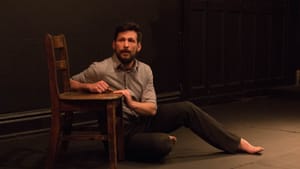Stay in the Loop
BSR publishes on a weekly schedule, with an email newsletter every Wednesday and Thursday morning. There’s no paywall, and subscribing is always free.
No break in 'The Fever'
Towards a Research Ensemble presents Wallace Shawn's 'The Fever'

The Fever won the 1991 Obie Award for new play, but its themes are even more relevant today. Actor Scott Rodrigue, a "psychophysical movement researcher," works under the name Towards a Research Ensemble and makes Wallace Shawn's solo show his own at Plays & Players' Skinner Studio.
Rodrigue --"communally directed" by a rotating panel of artists, peers, and mentors -- collaborates with designer Amanda Jensen, keeping the playwright's aesthetic for the piece in mind. Shawn, best known for the films My Dinner with Andre, The Princess Bride, and innumerable TV roles, first performed The Fever in apartments and later continued to reject lighting, sets, programs, or other theatrical trappings.
The Skinner Studio's walls and floor are black, with the audience in two small sections facing each other and back rows roped off "for the 1 percent." Jensen's lighting includes the audience as the production's most theatrical touch, gently sculpting the stage -- bare except for a chair and a cot -- and isolating Rodrigue skillfully.
Cognitive dissonance
Before the play, Rodrigue wanders, saying hello and offering beer. The text starts rather suddenly, without the usual division of lights to black. Wearing a gray button-down shirt and dark trousers, aside from the rakish curl of his moustache and his bare feet, he seems ordinary. He prowls the entire space, sometimes sitting in the audience, talking nonstop for nearly two hours.
An exercise in cognitive dissonance, the whole experience challenges us to adjust our theatrical expectations much as the speaker's assumptions about politics and economy evolve through the piece. Stuck in a hotel room in an unnamed "country where they don't speak my language," he analyzes bloated First World privilege and bleak Third World reality, questioning his lifelong assumptions through discussions of Chekhov's The Cherry Orchard, torture, pornography, and "commodity fetishism."
The dramatic action, if one can call it that, reveals the character's epiphany: "The life I lead is irredeemably corrupt." It's hardly a satisfying answer to questions about who we are, what we believe, and why it matters, but the lessons for the audience are clear. "We cannot escape our connection to the poor," he explains. But there's no call to action, no vision of what we can, should, or must do.
Self-flagellation
Brave though it is, and likeable as Rodrigue's voice and manner are, The Fever posesses a relentlessly humorless quality, not quite lecturing but also not emotionally engaging or suspenseful. Like most people likely to attend The Fever, I entered with some knowledge and empathy about economic inequality. The piece deepened my understanding of global economic forces, but didn't win my dramatic engagement. Perhaps my expectations of characters and stories are too ingrained and limiting to be overcome -- but without them, am I experiencing a play?
The Fever, however well-meaning, professionally produced, and smartly performed, doesn't reveal character or take risks. It's unclear when the performance ends if the protagonist will abandon his selfish, privileged existence. We already know the world's horrors, even if we, safe in our bubbles of luxury, avoid them. Can we change them? The answer, if there is one, might make a better play.
What, When, Where
The Fever. By Wallace Shawn, performed by Scott Rodrigue. Through April 22, 2017, at the Plays & Players Skinner Studio, 1714 Delancey Place, Philadelphia. (215) 735-0630 or playsandplayers.org.
Sign up for our newsletter
All of the week's new articles, all in one place. Sign up for the free weekly BSR newsletters, and don't miss a conversation.

 Mark Cofta
Mark Cofta